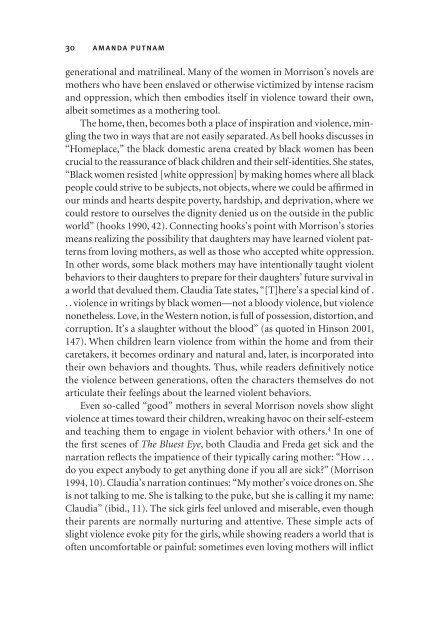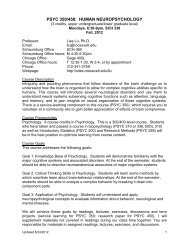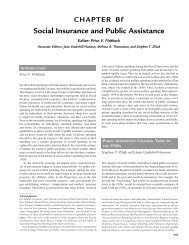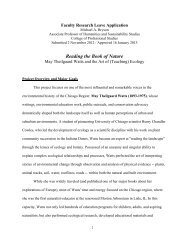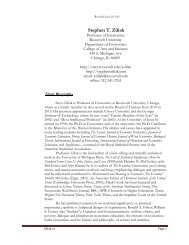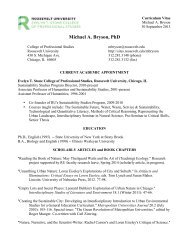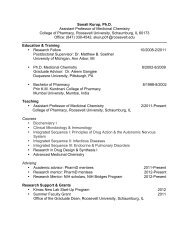Mothering Violence: Ferocious Female Resistance in Toni ...
Mothering Violence: Ferocious Female Resistance in Toni ...
Mothering Violence: Ferocious Female Resistance in Toni ...
Create successful ePaper yourself
Turn your PDF publications into a flip-book with our unique Google optimized e-Paper software.
30 amanda putnam<br />
generational and matril<strong>in</strong>eal. Many of the women <strong>in</strong> Morrison’s novels are<br />
mothers who have been enslaved or otherwise victimized by <strong>in</strong>tense racism<br />
and oppression, which then embodies itself <strong>in</strong> violence toward their own,<br />
albeit sometimes as a mother<strong>in</strong>g tool.<br />
The home, then, becomes both a place of <strong>in</strong>spiration and violence, m<strong>in</strong>gl<strong>in</strong>g<br />
the two <strong>in</strong> ways that are not easily separated. As bell hooks discusses <strong>in</strong><br />
“Homeplace,” the black domestic arena created by black women has been<br />
crucial to the reassurance of black children and their self-identities. She states,<br />
“Black women resisted [white oppression] by mak<strong>in</strong>g homes where all black<br />
people could strive to be subjects, not objects, where we could be affirmed <strong>in</strong><br />
our m<strong>in</strong>ds and hearts despite poverty, hardship, and deprivation, where we<br />
could restore to ourselves the dignity denied us on the outside <strong>in</strong> the public<br />
world” (hooks 1990, 42). Connect<strong>in</strong>g hooks’s po<strong>in</strong>t with Morrison’s stories<br />
means realiz<strong>in</strong>g the possibility that daughters may have learned violent patterns<br />
from lov<strong>in</strong>g mothers, as well as those who accepted white oppression.<br />
In other words, some black mothers may have <strong>in</strong>tentionally taught violent<br />
behaviors to their daughters to prepare for their daughters’ future survival <strong>in</strong><br />
a world that devalued them. Claudia Tate states, “[T]here’s a special k<strong>in</strong>d of .<br />
. . violence <strong>in</strong> writ<strong>in</strong>gs by black women—not a bloody violence, but violence<br />
nonetheless. Love, <strong>in</strong> the Western notion, is full of possession, distortion, and<br />
corruption. It’s a slaughter without the blood” (as quoted <strong>in</strong> H<strong>in</strong>son 2001,<br />
147). When children learn violence from with<strong>in</strong> the home and from their<br />
caretakers, it becomes ord<strong>in</strong>ary and natural and, later, is <strong>in</strong>corporated <strong>in</strong>to<br />
their own behaviors and thoughts. Thus, while readers def<strong>in</strong>itively notice<br />
the violence between generations, often the characters themselves do not<br />
articulate their feel<strong>in</strong>gs about the learned violent behaviors.<br />
Even so-called “good” mothers <strong>in</strong> several Morrison novels show slight<br />
violence at times toward their children, wreak<strong>in</strong>g havoc on their self-esteem<br />
and teach<strong>in</strong>g them to engage <strong>in</strong> violent behavior with others. 4 In one of<br />
the first scenes of The Bluest Eye, both Claudia and Freda get sick and the<br />
narration reflects the impatience of their typically car<strong>in</strong>g mother: “How . . .<br />
do you expect anybody to get anyth<strong>in</strong>g done if you all are sick?” (Morrison<br />
1994, 10). Claudia’s narration cont<strong>in</strong>ues: “My mother’s voice drones on. She<br />
is not talk<strong>in</strong>g to me. She is talk<strong>in</strong>g to the puke, but she is call<strong>in</strong>g it my name:<br />
Claudia” (ibid., 11). The sick girls feel unloved and miserable, even though<br />
their parents are normally nurtur<strong>in</strong>g and attentive. These simple acts of<br />
slight violence evoke pity for the girls, while show<strong>in</strong>g readers a world that is<br />
often uncomfortable or pa<strong>in</strong>ful: sometimes even lov<strong>in</strong>g mothers will <strong>in</strong>flict


